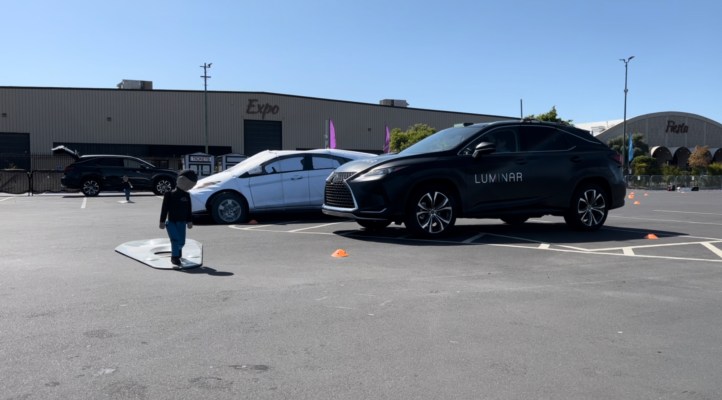At TC Sessions: Mobility, Luminar founder and CEO Austin Russell admitted that his now successful company was founded in hubris, but that a skeptical eye during peak lidar hype helped them focus on real markets. “It’s no longer about some theoretical promise — you actually have to show real results, real deliveries, real technology and product. There’s been too many promises made out there that were broken.”
In an interview with TechCrunch transportation editor Kirsten Korosec, Russell noted that he, like pretty much everyone else, was convinced early on that self-driving cars were just around the corner. (Quotes have been lightly edited for clarity.)
“The reality is, I think that the sheer complexity of solving an end to end autonomous driving problem in urban environments was underestimated in terms of the difficulty by at least a couple orders of magnitude,” he said. “If something is at peak hype cycle, it’s something you should be skeptical about. There was just a massive disconnect between the core engineers behind the actual tech, and leadership at the time, in terms of what was possible.”
It was in 2017, he recalled that the company made the decision to pursue other applications for high-performance lidar tech: “It became very clear that the level of requirements for an R&D test platform, versus a true series production vehicle, is a completely different game altogether. The huge roof racks that you see that are $100,000 and a supercomputer in the trunk… it needs to be more like $1,000. And by the way, economies of scale are fundamentally required to be able to build a product, the cost is a significant factor at the end of the day.”
The question became not one of raw capability or even just cost, but what would consumers, and by extension OEMs, pay for? Safety. And as it turns out, even top of the line ADAS and collision avoidance tech is seriously lacking right now.
“It’s surprising to see how ineffective the current assisted driving systems are just at being able to do basic things like… not letting you smash into the thing right in front of you in your car, right? It sounds like a simple problem, like you wouldn’t even need lidar for that,” he said. “But the reality is it’s a lot more complicated, a lot more difficult than that — to even confidently understand what’s going on around you and come to a safe stop is not a solved problem.”
The company has set up numerous examples of these failures — one of which showing a small fake pedestrian being plowed down by an ADAS-equipped car went viral. The combination of robo-taxis being far further out than expected and of ADAS systems as being both desirable and incapable seems to have spurred mainstream automakers to invest heavily in something better.
“The transformation is that this is no longer about being an option on a high end, niche vehicle,” he explained. “This is something that has the opportunity to truly go mainstream, in the mass market… Nissan, they were actually showing off crash avoidance scenarios made possible by Luminar lidar; in their case they actually said they want to be able to standardize this type of tech on every vehicle they build by the end of the decade. Which I think is probably faster than any major tech adoption cycle, not for initial adoption, but full standardization across the lineup.”
There will of course be Luminar-powered cars out there sooner than that: “Within the next 12 months there’s going to be series production cars that are Luminar equipped that are out there advancing this industry forward,” Russell confirmed.
It’s funny to think, however, that a company born out of a plan to obsolete traditional vehicles has become the biggest proponent of its use in those vehicles. But an early recognition of the future of the industry made all the difference.
“We probably shouldn’t have existed,” Russell said when asked about taking part in the hype cycle he later distanced himself from. “There’s no reason why any of the Googles, Apples, all the major automakers and other stuff couldn’t have, in some theoretical world, done exactly what we did.”
“But the reason why were were able to build this company, this technology, this product and help lead the industry with it is just fundamentally because we had a completely different viewpoint. I guess what’s titled here [i.e. the name of the panel, A Contrarian View on Deploying Autonomy at Scale], the contrarian view,” he said, laughing.
As for another contrarian view, the oft-repeated jibe by Elon Musk that lidar is unnecessary and Tesla will get by without it, Russell took it in good humor as well:
“If somebody didn’t go out and say, ‘this is a fool’s errand, this shouldn’t exist, we made the right decision and we’re sticking to our guns!’… that’s the irony around all these things. It actually just calls attention to what’s important, because you only say that if you’re really self-conscious about it.”
